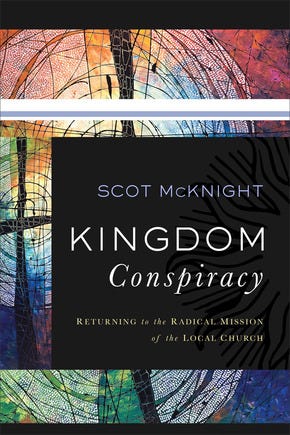Kingdom of God: Scot McKnight, Yoder, and Constantine
Part 4 on the Kingdom of God.

Scot McKnight, in Kingdom Conspiracy: Returning to the Radical Mission of the Local Church, lays out the case for the Anabaptist view of the kingdom.
The Kingdom of God as God’s Rule Over His Church
McKnight contends,
“‘A people governed by a king’—this is how the Old Testament uses the term ‘kingdom.’…Israel is a kingdom. Moses legislates how a king in Israel is to behave: ‘When he takes the throne of his kingdom, he is to write for himself on a scroll a copy of this law’ (Deut. 17:18). If he does this, that king ‘will reign a long time over his kingdom in [the land of] Israel.’ (Deut. 17:20).” (Kingdom Conspiracy, pp. 68, 69)
In his book, McKnight deeply criticizes the view of the influential George Eldon Ladd. And he has a point. He says that for those who follow Ladd’s conception of the kingdom,
“The word ‘kingdom,’ then, is not a place or a space or a realm or a people with boundaries and kings and a temple. No, ‘kingdom’ refers to the abstract dynamic that God is now at work redeeming individuals in Jesus Christ in this world, and this rule in Jesus Christ will be completed and universal at the eschaton when the kingdom arrives fully.” (Kingdom Conspiracy, p. 13)
McKnight counters,
“Over and over, the word ‘kingdom’ in the Old Testament refers to a people governed by a king. Any suggestion, then, that ‘kingdom’ means only ‘ruling’ or ‘reigning’ cannot satisfy what the Bible explicitly affirms… Gerhard Lohfink, a German scholar, pushes against this all-too-common conclusion in these memorable words: ‘A king without a people is no king at all but a figure in a museum.’ He’s right. To say that kingdom is ‘reign’ is to tell half the story.” (p. 70 & 74)
Some in the missional church movement resonate with McKnight’s vision of the kingdom and church, stating,
“The missional church as an alternative community is called to demonstrate an alternative culture in a fallen world, to engage in practicing alternative economics, and to provide the world with an example of living out an alternative approach to the exercise of power. This takes place as the missional church embodies Jesus’s mission and patterns as its own actions in the world.” (Craig Van Gelder and Dwight J. Zscheile, The Missional Church in Perspective: Mapping Trends and Shaping the Conversation, Baker Academic, 2011, p.50).
The Constantinian Temptation
One of the main concerns that many in the missional church movement articulate concerning the North American church is what Scot McKnight calls “The Constantinian Temptation,” which flows from John Howard Yoder.
Yoder scholar Chris Huebner wrote,
“Perhaps the most recurring theme in Yoder’s theology is his depiction and critique of ‘Constantinianism.’ In short, Yoder argues that the history of Christianity must be read in light of a deep and lasting, though often subtle, shift that took place with respect to the relationship between church and world, and which he claims is best associated with the reign of Constantine.
Whereas pre-Constantinian Christianity was that of a minority church existing in a world that was largely hostile toward it, Yoder claims that the Constantinian shift resulted in an alignment of the church with the ruling political regime of the day.
As Yoder himself describes it, the structure of Constantinianism is rooted in the ‘basic axiom’ that ‘the true meaning of history, the true locus of salvation, is in the cosmos and not in the church. What God is really doing is being done primarily through the framework of society as a whole and not in the Christian community.’
It is important to recognize the sense in which Yoder identifies the Constantinian temptation as existing even in a supposedly post-Constantinian context, in which the church is officially separate from the state. Short of the actual institutional alignment of church and state, Yoder claims that Constantinianism continues where there is merely a formal identification of the church with the prevailing political establishment, as in American public discourse.
Yoder maintains that it is only through its concrete presence as an alternative community that the church can truly serve as a witness to the world.”
(Chris Huebner, A Precarious Peace: Yoderian Explorations on Theology, Knowledge, and Identity (Waterloo, Ontario: Herald Press, 2006), 57-8.)
Be sure to hear this: The Anabaptist tradition sees that the focus of God’s redemptive work is in and through the church. That sounds right and biblical. But they also say that, therefore, when Christians try to impact society or culture or speak of a “cosmic salvation” outside of the framework of the local church, it creeps toward “Constantinianism” because it inevitably melds church and state.
Scot makes this case in his book Kingdom Conspiracy. For instance:
“When the majority of the citizens are Christian, as they were more or less in Europe and North America until later in the twentieth century, the culture takes on Christian themes naturally, and Christians are able to influence culture. But when Christianity became less and less the majority, Christians began to raise their voices in protest and—here is the element we must observe—they sought through political means to influence culture and state.” (Kingdom Conspiracy, p. 216)
America’s Drift Toward Constantinianism
Again, Scot has a point! We have indeed seen this in America in recent decades as well. The “Religious Right” in the 1980s has morphed into today’s Christian Nationalism in various states of expression, from the moderate (which looks like Christians who are also patriotic) to the extreme (which looks like what happened on January 6, 2021).
Politicians have latched onto this renewed zeal for taking back America in the name of Christ, from Marjorie Taylor Greene to Josh Hawley to Mike Johnson, not to mention Donald Trump.
Christian leaders have encouraged their flocks to do so as well, from Franklin Graham to Mike Huckabee to Robert Jeffress. The New Apostolic Reformation is a charismatic movement that has adopted a Christian nationalism that advocates a “Seven Mountain Mandate,” which takes the cultural mandate and synthesizes that with charismatic eschatology to create a dominionist theology where Christians are mandated to take over all the cultural spheres, especially government.
These are indeed troubling developments. No matter what Christian tradition you find yourself in, I’d think you’d say, “Well, that is not the kingdom of God!” So, the Anabaptists have some things to teach all of us when it comes to this stuff.
Reign over People or Reign over the Cosmos
According to Yoder and now McKnight (and I can add names like Shane Claiborne and David Fitch to the mix), the kingdom of God must be understood as God’s reign over his people, which occurs primarily in the local church context. It is more concerned about the church being a countercultural entity that bears witness to God’s subversive kingdom over against the kingdoms of the world.
They want us to move away from the whole idea of trying to transform culture because it inevitably leads to the Constantinian Temptation, that is, to do so through political means. And for them, the political realm is one of the “kingdoms of the world” in opposition to the kingdom of God.
So, this raises some very important questions.
Is the kingdom of God manifested exclusively in the church, that is, in the people of God gathered for the sake of being a counter-culture?
Are we misguided when we seek to transform the fallen world?
On the other hand, is there a way to seek to transform culture without succumbing to the Constatinian Temptation?
Is there a way to both embrace the essential role of the church for community, spiritual formation, word, and sacrament while also empowering Christians to engage the culture outside the church to promote the common good through their various vocations?
More to come! Stay tuned…


